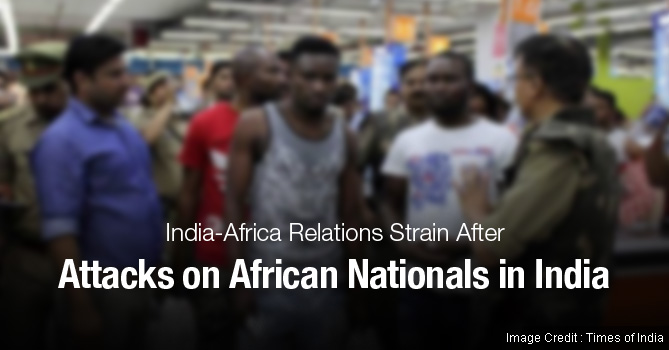The incident of physical assault on Nigerian students in Greater Noida following the death of a school boy due to overdose of drugs, cannot become an impediment in the way of India’s pro-active engagement with Africa.
Nor African diplomats’-issued joint statement, in which they called the attack “racial” and “xenophobic”, would derail relations between the two sides. Yet, it is not something which could be put under the carpet, especially now that some heads of New Delhi-based diplomatic missions of Africa have demanded a probe into the incident by the UN, the Human Rights Councils and other human rights bodies.
It is a snub to India. It indicates African countries’ anger against New Delhi which, in their opinion, has done precious little in stemming attacks on African students. For the second time in a row in the last two years, the Indian government has found itself in a soup over the issue of attack on African students.
In February, 2016, a 21-year-old student from Tanzania was brutally assaulted in Bengaluru and her car was set on fire. It was followed by killing of Congolese youth in May in New Delhi’s Vasant Kunj area. When New Delhi-based African embassies raised their voice against these incidents and termed the attacks as racial ones, the External Affairs Ministry said, “these were not premeditated acts against a particular community, rather these were spontaneous attacks perpetrated by anti-social and criminal elements.”
Are These Attacks Carried Out of Racial Hatred?
Question is: Should New Delhi see these attacks merely from the law and order angle, or it should also see them from the racial angle? The latter seems to be far difficult for the government to take up as the cause of attacks on Africans. In fact, no government of a country, where assaults or killings have taken place due to racial reasons, can tar the image of its own country by instituting a probe into incidents premised on racial angle.
Several Indians have been killed and assaulted in the US and Australia in the recent past, but has the US administration or the Australian government ordered investigations to find out racial biasness into those killings and assaults? The answer is no, because the word “racial discrimination” is a subjective one and to prove it legally, in a court of law, is as difficult as finding a needle in a haystack.
But still, India can’t escape an inviolable fact that its society is deeply sensitive on the colour issue. Those who are not fair in their skin are showered with humiliating words like “kallu”, “blackie”, “kaalta”. Particularly in North India, parents with dark-skinned daughters find it very difficult to get grooms. Therefore, biasness towards dark-skinned men or women is ingrained in the mindset of North Indians.
It can’t, however, be termed outright as racial, because it is not in practice in sports, education or jobs. No person is selected in sports or educational institutes or gets a job in India on the basis of his or her colour of skin.
Can Attack on Africans Impact the Country’s Interest?
Africans do come to India for education and medical treatment. According to an estimate, around 40,000-45,000 students from various African countries are currently in India pursuing various educational courses. They value Indian education system, which, in turn make them pro-Indian in their feeling and perception.
In many African nations, head of states have their degrees from India, thereby making them pro-India in the face of tough completion from China, which is aggressively wooing Africans by pumping in money and investments. Also, a number of Africans prefer India than Malaysia, Indonesia, or Philippines for medical treatment. Despite not sharing the same culture, their finding a commonality on the front of communication make Africans take the India route.
They are ones who are regularly invited by the government for military, industrial or any other training. Therefore, a large number of Africans are familiar with Indian culture, customs and traditions. In that way, it will not be hyperbole to say that a large number of Africans feel at home in India, whose diplomatic outreach towards Africa has proved more beneficial than expected.
Largely based on financial assistance and capacity-building programme, India’s Africa outreach has enriched relations between the two sides. In this context, if attacks on Africans continue to take place, India will not only lose a significant proportion of foreign currencies that these African students or patients bring, it may also lose an important supporting block in (and even outside) the United Nations.
Almost all 54 African countries are supporting India in its bid to become a permanent member of the UN Security Council. While Namibia is a member of the 48-nation Nuclear Suppliers Group (NSG), South Africa together with India is a member of BRICS, G-20 and IBSA.
Conclusion
New Delhi will lose trusted friends from Africa if attacks on students or nationals belonging to the African continent continue to take place. In fact, India shares a historical bond with Africa. It is said that Mahatma Gandhi would not have achieved success in making British colonial rulers move out of India, had he not been in South Africa.




